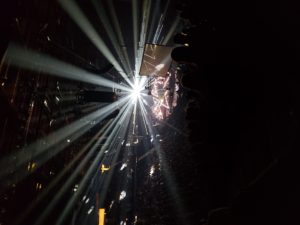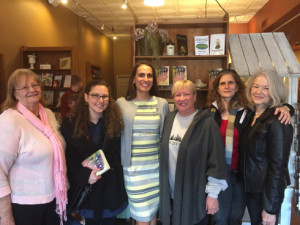I crossed off a bucket list item and finally saw Bon Iver perform live this weekend. The band has been a favorite for a long time, but despite my interest in seeing them play, I’ve never been quite able to make their times and locations—which were generally small venues in just out of reach places.
In this tour (for their new album i,i), though, they’re playing large arenas and setting their indie folktronica music to blaring sound and flashing lights. The lead singer of Feist, who opened for them, prepared us by referring to the impending show as “the magic carpet ride” we were about to see—which it totally was. The arena full of die-hard fans could do little more than stare wide eyed and drop-jawed at what we were witnessing, maybe with some head nodding and word mouthing when we could manage it. The lights were captivating and the cutting edge speaker system brought the music right to you and through you. It was unlike any concert I’ve been to.
And in the center of the sound and lights and a host of other talented musicians stood Justin Vernon, lead singer and the band’s founder in his t-shirt and sweatband, singing and playing his guts out.
I admit, I love to see artists doing their thing, sharing their art. It’s crazy to me how vulnerable it must feel to be belting your tunes and lyrics to hundreds of people—and he did make comments about how odd and surreal it was to be playing an to an audience that size. His humility was endearing, and I couldn’t help thinking about his first album, the one that first drew me to the band, For Emma, Forever Ago.
Apparently, Vernon wrote that album after his life kind of fell apart. After his band broke up and his relationship ended, he retreated with a bad case of mono and some recording equipment to his dad’s cabin in Wisconsin. There he wrote and recorded the series of songs that became the album. The songs are original, folksy, sometimes ethereal, and often sound just like a Midwestern winter to me.
It was fun sitting in that huge arena seeing and hearing the music on that scale and thinking it all began in a winter cabin with one guy writing songs. Making his art. Having the courage to put it out there. It inspires me when I sit in my upstairs bedroom on cold Midwestern days and write my own stuff, hoping there’s something worth putting out there.
His songs aren’t perfection; in fact, sometimes they feel a little chaotic, and his lyrics are only marginally decipherable. But through it all comes these moments of genius—a swell, a chorus, a phrase that cuts deep or inspires emotion or connection, and I think, “Wow. This is art.”





